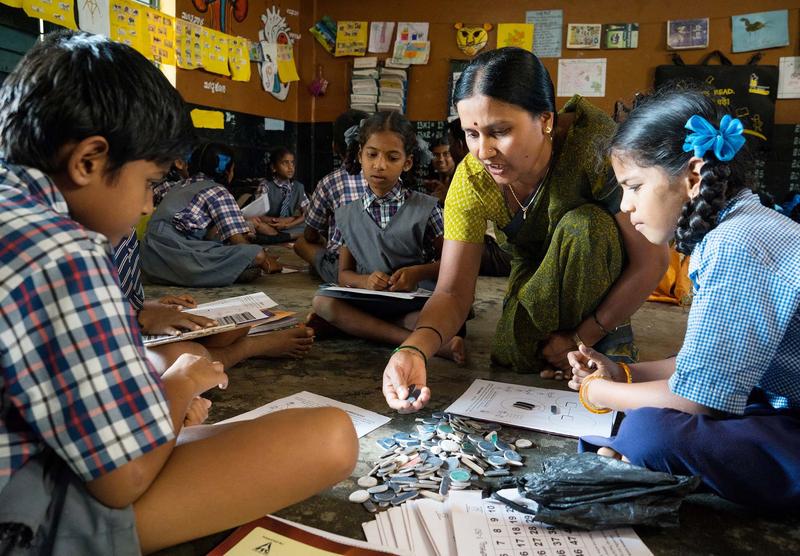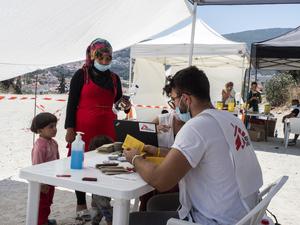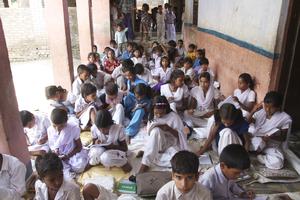 Pratham Education Foundation developed the technique, "Teaching at the Right Level" which has helped millions of children in India learn to read and to do basic arithmetic. (PHOTO / PRATHAM EDUCATION FOUNDATION)
Pratham Education Foundation developed the technique, "Teaching at the Right Level" which has helped millions of children in India learn to read and to do basic arithmetic. (PHOTO / PRATHAM EDUCATION FOUNDATION)
As the global poverty and school closure situation will further deteriorate in the future due to the outbreak of COVID-19, the role of global humanitarian work to address the crises is warranted.
COVID-19 has forced schools to close, but it fails to halt the determination and dedication of a group of educators who fight hard amidst the pandemic crisis to tackle the problem of illiteracy among India’s poorest children.
COVID-19 has forced schools to close, but it fails to halt the determination and dedication of a group of educators who fight hard amidst the pandemic crisis to tackle the problem of illiteracy among India’s poorest children
A World Bank report predicts that school closures risk a loss of earnings of US$10 trillion over time for this generation of students. The pandemic already pushed 1.6 billion students around the world out of school at the peak in April this year.
Pratham Education Foundation, the 2018 Positive Energy Prize laureate of LUI Che Woo Prize, faced a big challenge when schools were required to lockdown due to the pandemic. While many schools around the world have turned to online teaching, Pratham and their students do not have the luxury of wifi and internet connection. Many students in the rural areas simply do not have smartphone or internet access.
But instead of being defeated, Pratham rolled up its sleeves and developed a “remote learning” mode of schooling by making use of SMS on mobile phones. They started sending out one SMS message a day for students across the 11,000 to 12,000 Indian villages, a message that contained an engaging activity with an instruction of no more than 160 words.
Then they would follow up with phone calls to parents for feedbacks and determine how the programme could be improved.
ALSO READ: Chinese archaeologist wins 2019 Lui Che Woo Prize
“We have seen a big jump in parental response even among those who are not very educated,” said Dr Rukmini Banerji, Pratham’s Chief Executive Officer. “This is a new opportunity for mitigating disadvantage, identifying a silver lining in the current cloud.”
Another LUI Che Woo Prize laureate (2016 Positive Energy Prize), former US President Jimmy Carter, has urged donors to his foundation to forgo their gifts this year and instead contribute to efforts in fighting the COVID-19 pandemic, one of the biggest crises to hit humankind in generations.
 MSF vaccination in Vathy camp, Samos, July 2020. The vaccination aims to immunize more than 600 children between 2 months and 5 years old against common childhood diseases. (ENRI CANAJ / MAGNUM PHOTOS FOR MSF)
MSF vaccination in Vathy camp, Samos, July 2020. The vaccination aims to immunize more than 600 children between 2 months and 5 years old against common childhood diseases. (ENRI CANAJ / MAGNUM PHOTOS FOR MSF)
Throughout the years, President Carter and the Carter Center have worked to improve global health conditions through the successful control and eradication of diseases such as Guinea worm disease, river blindness, lymphatic filariasis, and schistosomiasis in Africa.
“The virus and its impact must be addressed at every level of government and society,” he wrote in a March message.
In the message, President Carter expressed his gratitude to volunteers and community organisations that had quickly mobilized to help those in need under the COVID-19 attack. He stressed that the challenge now was undoubtedly to bring the pandemic under control and to study ways to alleviate the extreme economic hardships that were likely to result from the lockdowns.
ALSO READ: Educators, climate change fighters win Lui Prize
According to World Bank estimates, the COVID-19 pandemic is expected to push an additional 88 million to 115 million people into extreme poverty (living on less than US$1.90 a day) this year, with the total number rising to as many as 150 million by 2021. People living in hard-to-reach areas and migrant shelters have become more vulnerable and helpless with the threat of COVID-19.
But they are never too far for Medecins Sans Frontieres (MSF), the 2016 Welfare Betterment Prize laureate of the LUI Che Woo Prize. MSF has been striving hard to provide healthcare and deliver supplies to areas most in need, from the Rohingya refugee camps in Bangladesh, to migrant shelters in the Greek Islands and war-ravaged hot spots such as Yemen.
 Pratham Education Foundation works directly with children to improve basic literacy levels, as well as through partnerships with government systems to guide education policy. (PHOTO / PRATHAM EDUCATION FOUNDATION)
Pratham Education Foundation works directly with children to improve basic literacy levels, as well as through partnerships with government systems to guide education policy. (PHOTO / PRATHAM EDUCATION FOUNDATION)
“Every crisis brings its own unique challenges to be overcome and those presented by COVID-19 are manifold. For example, air travel was severely disrupted at the beginning of the outbreak, limiting movement of people, medical equipment and supplies to affected areas, and put great constraints to the work of MSF,” said Gert Verdonck, MSF Hong Kong Interim Director of Operations Support Unit.
To improvise, NGOs started to help each other by sharing capacity on flights, bringing medical personnel and supplies to areas most in need.
READ MORE: Lui Che Woo Prize presentation ceremony held
In anticipating a vaccine to become available, MSF could not stress more about its concern on equitable distribution. It says it will deploy its powers of advocacy to create awareness and bring pressure to bear on governments to call for fair distribution and access.
The LUI Che Woo Prize was established in 2016 to acknowledge significant achievers in three aspects: sustainable development, mankind welfare improvement, and the promotion of positive life attitudes and energy. The Prize always encourages collaborative efforts between its laureates and interested parties for a more harmonious world.


